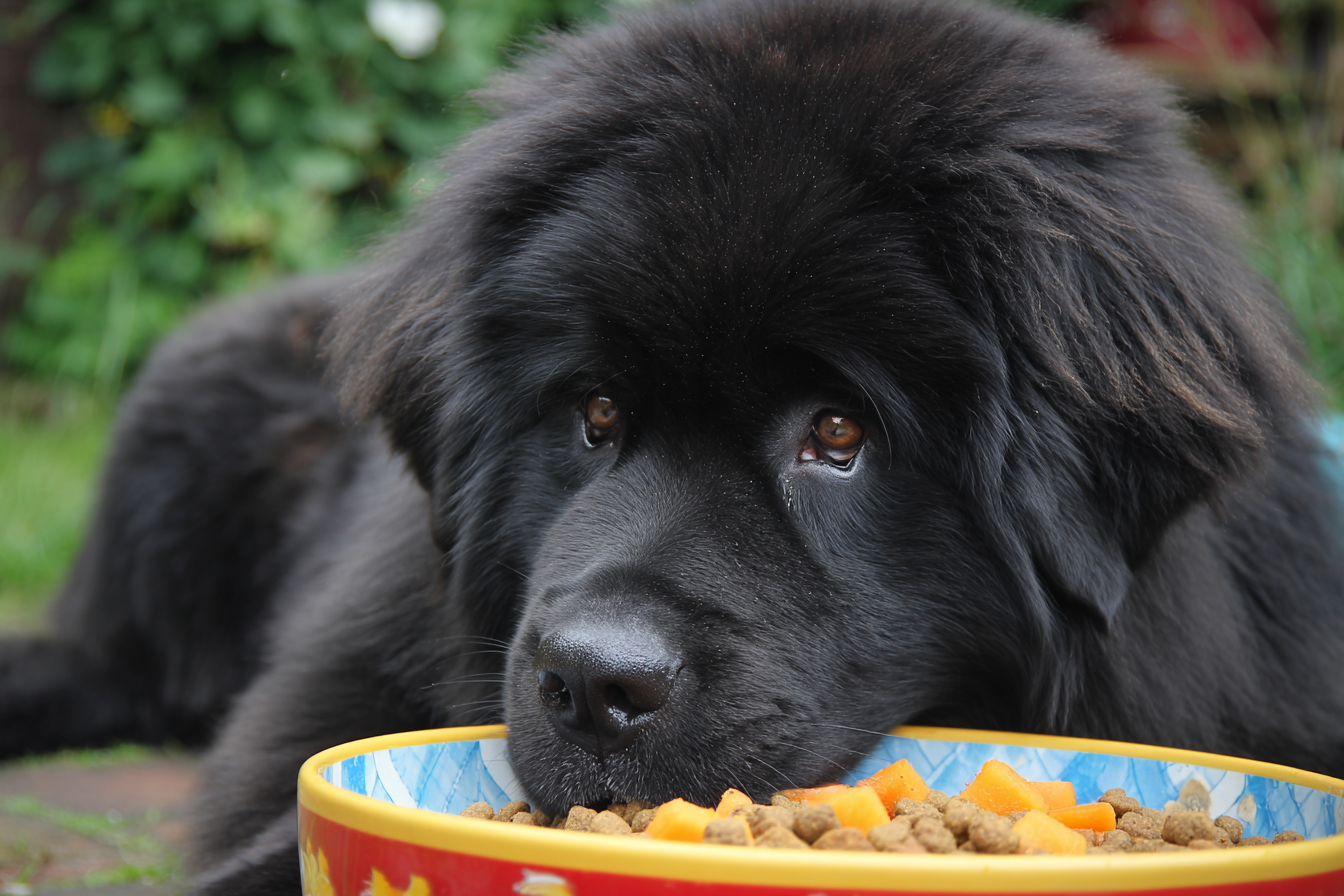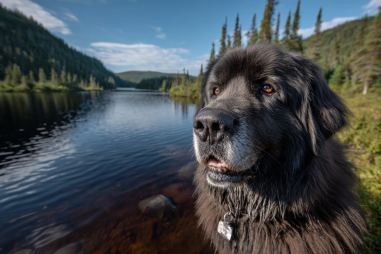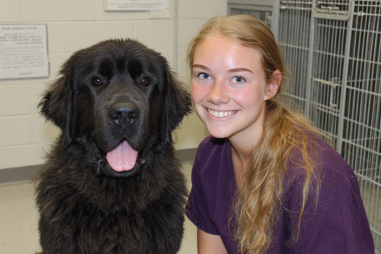Owning a Newfoundland dog is a rewarding experience, but it also comes with the responsibility of meeting the unique nutritional needs of this gentle giant. Due to their impressive size and moderate activity levels, Newfoundland dogs require a carefully balanced diet to support their overall health, growth, and longevity. Whether you’re welcoming a bouncy Newfoundland puppy, managing an active adult, or caring for a senior dog, understanding the right feeding habits and nutritional guidelines is key. Let’s explore everything you need to know about feeding your Newfoundland dog to keep them thriving at every life stage.
How Size Affects Diet Requirements
Newfoundlands are one of the largest dog breeds, often weighing between 100 and 150 pounds, with some males tipping the scales even higher. Their size dramatically influences their dietary needs because larger dogs require more calories, protein, and nutrients to maintain muscle mass and support organ functions. However, it’s important to strike a balance; overfeeding can lead to obesity and put excessive strain on their joints, which are already prone to hip dysplasia and other orthopedic issues common in giant breeds.
Additionally, their slow growth rate means their diet must be controlled carefully during puppyhood to avoid rapid weight gain, which can stress developing bones and joints. In adults, maintaining an ideal weight will help them stay active and reduce the risk of chronic health problems. Therefore, feeding Newfoundland dogs is not just about quantity, but quality and timing as well.
Recommended Daily Calorie Intake
The daily calorie needs of a Newfoundland dog vary based on age, activity level, metabolism, and overall health. On average, an adult Newfoundland with moderate activity requires about 1,800 to 2,700 calories per day. Puppies and highly active dogs might need more calories to support growth and energy, while senior dogs often require fewer calories due to reduced activity and slower metabolism.
Here is a rough guideline by life stage:
- Puppies: Around 2,500 to 3,200 calories daily, split into multiple meals to fuel growth without overfeeding.
- Adult Newfoundlands: Between 1,800 and 2,700 calories, depending on activity and weight.
- Seniors: Closer to 1,500 to 2,000 calories, with adjustments as needed for health conditions or decreased mobility.
It’s always best to work with your veterinarian to tailor the calorie intake to your dog’s specific needs, consistently monitoring weight and adjusting portions responsibly.
Best Types of Food: Dry, Wet, Raw
Choosing the right type of food for your Newfoundland is another essential aspect of their nutrition. Each type—dry kibble, wet canned food, or raw diets—has its benefits and considerations.
Dry Food (Kibble)
Dry kibble is popular for its convenience, affordability, and dental benefits. It typically helps reduce tartar buildup through chewing and can be stored easily. Look for high-quality formulations specifically designed for large or giant breeds, ensuring balanced nutrition with adequate protein and joint-supporting nutrients like glucosamine.
Wet Food
Wet food can be more palatable and hydrating, which is helpful if your Newfoundland isn’t drinking enough water. However, it often comes with a higher price tag, and prolonged feeding of only wet food may contribute to dental issues due to lack of chewing action.
Raw Diet
Some owners opt for raw diets to mimic ancestral feeding and promote shinier coats, smaller stools, and enhanced energy. While a raw diet can be beneficial, it requires careful planning to ensure it is nutritionally complete and safe from pathogens. Consulting with a veterinary nutritionist is advisable before starting this approach.
Ultimately, mixing high-quality dry food with occasional wet food or raw supplements can provide balanced nutrition while keeping mealtime interesting.
Essential Nutrients for Newfoundland Dogs
Every Newfoundland’s diet should include a balanced mix of essential nutrients to maintain optimal health:
- Protein: Supports muscle development and maintenance. Look for meat as the primary ingredient—chicken, beef, fish, or lamb.
- Fats: Provide energy and help maintain healthy skin and coat. Omega-3 and Omega-6 fatty acids are particularly beneficial.
- Carbohydrates: Offer energy and fiber. Whole grains like brown rice or oats, or vegetables like sweet potatoes, are good sources.
- Vitamins and Minerals: Vital for immune function, bone health, and overall wellness. Calcium and phosphorus ratios are especially important for large-breed dogs.
- Glucosamine and Chondroitin: These supplements support joint health, which is critical given Newfoundlands’ predisposition to joint problems.
Feeding a balanced commercial diet formulated for large breeds usually covers these bases, but always check ingredient labels and consult your vet if you plan to prepare homemade meals.
Feeding Puppies vs. Adults vs. Seniors
Newfoundland dogs have different nutritional needs throughout their lifetime, and feeding plans should adjust accordingly.
Puppies
Puppies grow rapidly and need a nutrient-dense diet tailored for large breeds to prevent developmental problems. Their food should be rich in protein and controlled in calcium and calories to avoid overly rapid growth, which can cause bone and joint issues. Feeding should be frequent—typically three to four meals daily—to provide steady energy.
Adults
Adult Newfoundlands benefit from a balanced diet that maintains muscle tone without promoting excess weight gain. Portion control and calorie monitoring become more critical in this phase. Depending on lifestyle, you might reduce calories slightly if your dog is less active and increase them when they are active or working.
Seniors
Seniors often have reduced energy needs due to decreased activity levels. Their diets may require adjustments in protein for muscle maintenance, added joint supplements, and easily digestible ingredients to support digestive health. Lower fat and calorie intake help prevent obesity, and foods with antioxidants can aid immune function.
Treats and Supplements
Treats are a great way to reward your Newfoundland, but they should be given in moderation to avoid excess calorie intake. Opt for healthy treats like small pieces of cooked meat, vegetables (such as carrots or green beans), or specially formulated dog treats low in calories and free from harmful additives.
Supplements can complement your dog’s diet but should be chosen carefully. Popular supplements for Newfoundlands include:
- Glucosamine and Chondroitin: For joint health support
- Fish oil (Omega-3): For skin, coat, and inflammation reduction
- Probiotics: To support digestion and gut health
Always consult with your veterinarian before adding supplements to ensure safety and appropriate dosing.
Avoiding Common Dietary Mistakes
When feeding a Newfoundland, several dietary pitfalls are important to avoid:
- Overfeeding: Providing too many calories can lead to obesity and strain on joints.
- Inappropriate puppy diets: Feeding generic puppy food without consideration for large breed growth can cause developmental issues.
- Human foods: Avoid feeding chocolate, grapes, onions, garlic, and other toxic foods. Also, rich or fatty foods can cause pancreatitis.
- Lack of portion control: Free-feeding or inconsistent portion sizes can lead to overeating.
- Neglecting hydration: Always provide fresh water, especially if feeding dry kibble.
Regularly reviewing your dog’s weight, body condition, and overall health with your vet helps catch potential problems early and adjust the diet as needed.
Support Your Newfoundland’s Health Through Thoughtful Nutrition
Feeding your Newfoundland dog involves more than just filling a bowl—it’s about providing balanced nutrition tailored to their giant frame, life stage, and activity. By understanding their unique dietary needs, choosing the right type of food, offering appropriate treats and supplements, and avoiding common mistakes, you can help your gentle giant live a vibrant, healthy life. Remember to keep your veterinarian involved in your dog’s nutrition journey for personalized guidance and support every step of the way.







